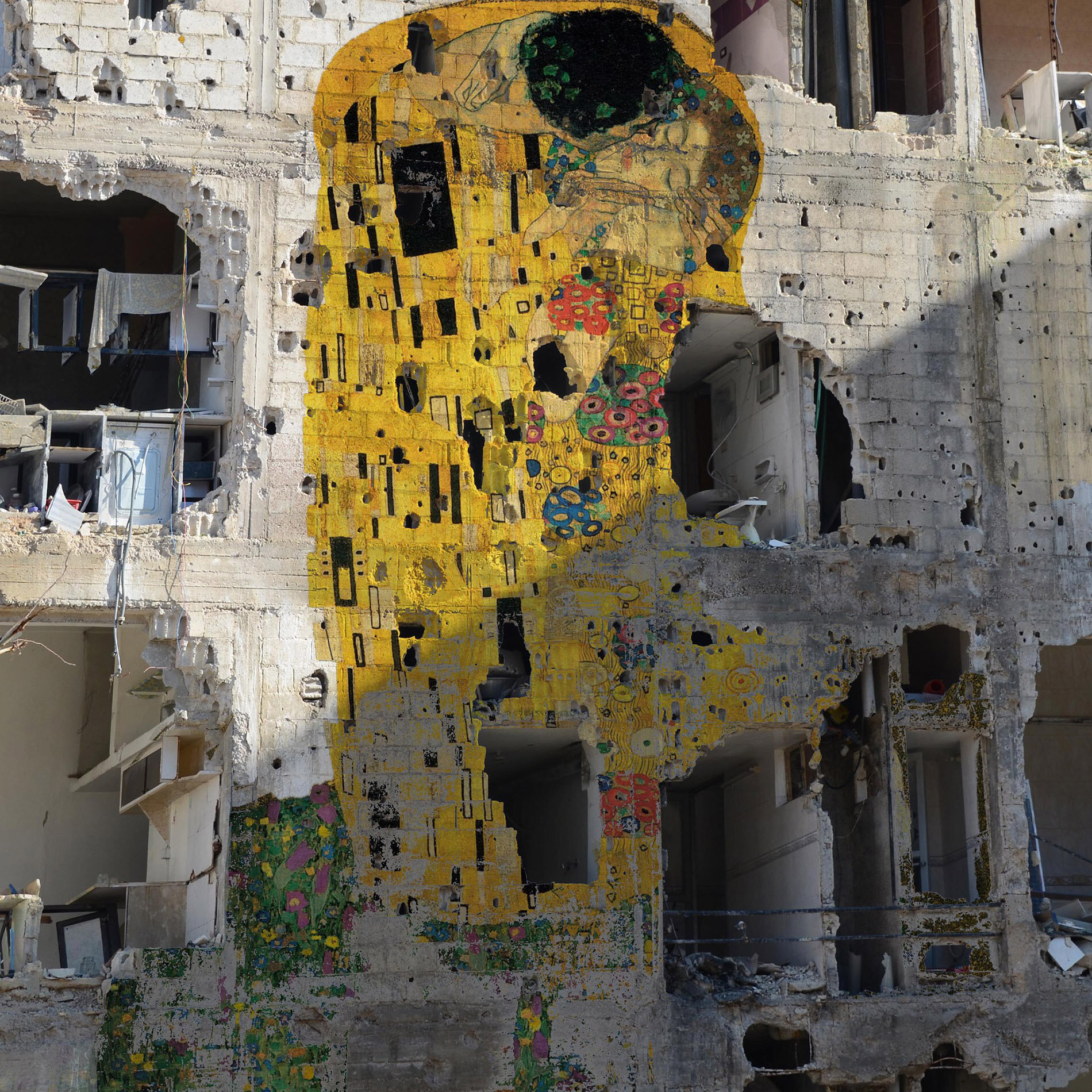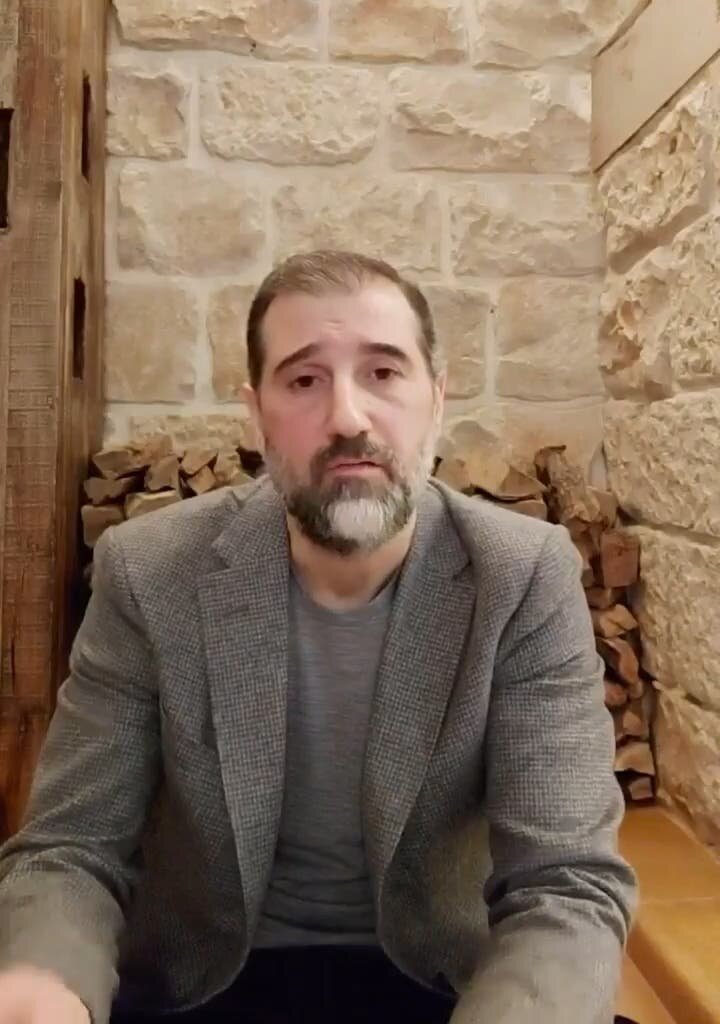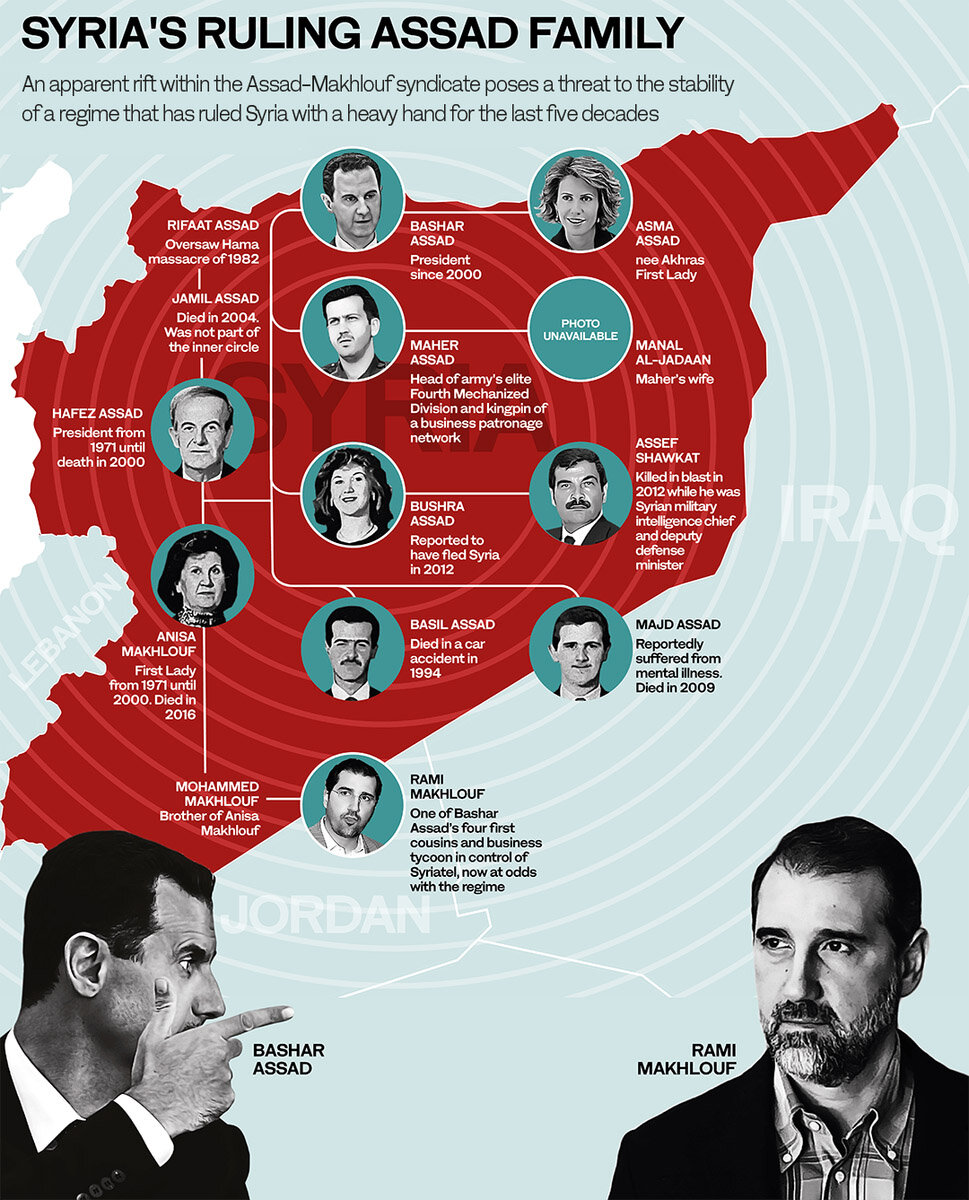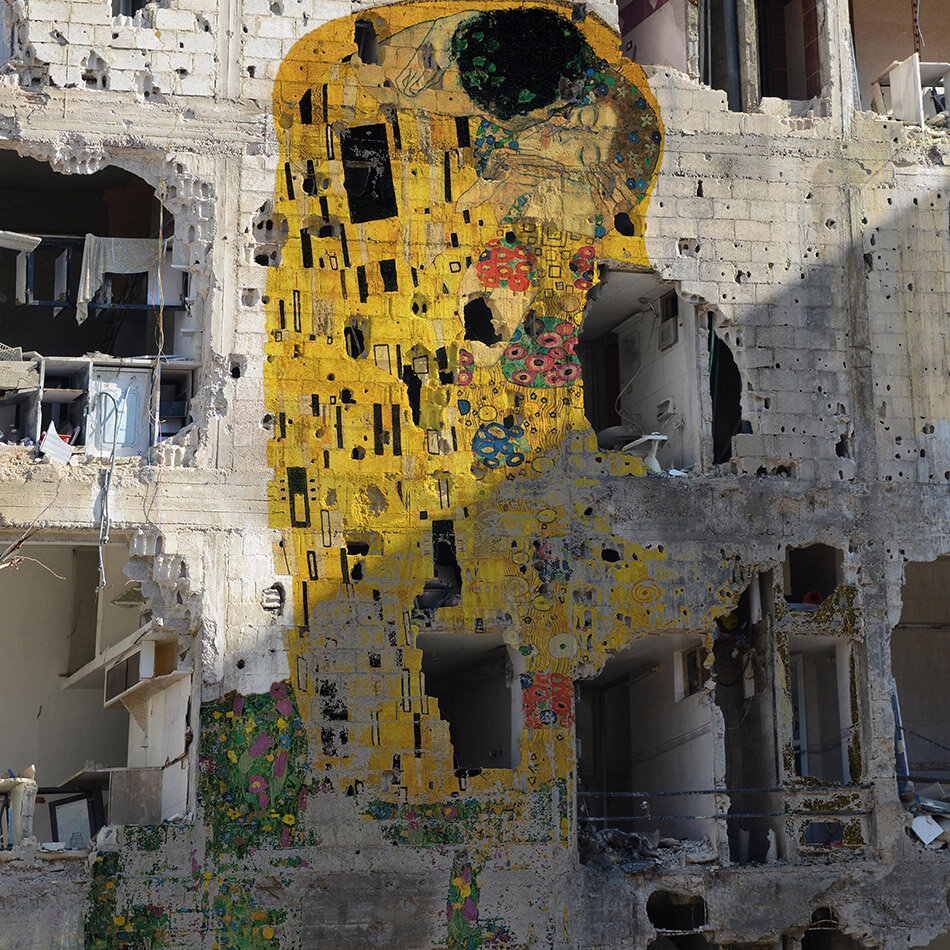
Damascus reimagined by Syrian artist Tammam Azzam – “Klimt freedom graffiti,” 2013 (Photo Ihab Aljaby).
Lawrence Joffe
It seems almost tasteless to write about a sordid family dispute over money in a country which has suffered a decade of brutal warfare. More than half a million have died in Syria, mostly civilians; another 12 million were forced to flee their homes. Thousands of political prisoners remain “missing”; and reports of torture in both government and rebel prisons are rife.
Yet in many senses the little private squabble goes to the heart of the crisis. And wasta is a key ingredient — one that assumes a new order of magnitude when it involves one man controlling 60 percent of a nation’s economy.

That was the case with Rami Makhlouf in Syria. First cousin to President Bashar al-Assad, owner of a fleet of companies and trusts, both open ones in Syria and clandestine ones offshore, Rami claimed to represent some 200 foreign firms and became the conduit for nearly every inward investment in the land. Not much moved without his say-so. Each kickback enriched him and further entrenched his power. It was said he could sack anyone with a single telephone call. One former Syrian official estimated his personal wealth at eight percent of Syria’s GDP, or $62 billion. And virtually everyone had to kowtow to a single figure, which surely constitutes the dictionary definition of gross corruption.
The flagship of his enterprise was Syriatel, Syria’s main mobile phone provider and most lucrative industry. True to form, Makhlouf also enjoyed interests in its smaller telecom rival, MTN. Besides that he came to own duty-free shops in Syria and enterprise zones in Lebanon, and ran most of Syria’s engineering and construction, tourism and real estate, banking and insurance, and oil and gas projects.
Mergers and acquisitions Makhlouf-style meant sending in armed mukhabarat (security forces) to frighten competitors. This led the US Treasury to directly sanction Makhlouf in February 2008 for benefiting from “public corruption.” The EU followed suit in 2012. Not that this stopped him. On the contrary, Makhlouf garnered yet more wealth by offering secret pathways for illicit money and apparently drugs to flow in and out of Syria. In April 2020, for instance, four tons of hashish were discovered in Port Said, Egypt, wrapped in the packaging of the Makhlouf-owned Milkman company.
Keeping it in the family
Officially, the Ba’ath Party has governed Syria since 1963 on the basis of “unity, freedom and socialism.” Much of the Baathists’ appeal lay in the way they took on the corrupt Sunni business families in Aleppo and Damascus, who had dominated Syrian politics under the French mandate, and immediately after independence in 1946. Supposedly the nation’s poorer Sunni peasant majority, as well as destitute minorities, like the Alawites, would be the new beneficiaries.
In reality, after 1971 Syria found itself saddled with a double-dynasty whereby one family (Assad) enjoys absolute political power while their relatives by marriage (Makhlouf) have dominated the economy. Bashar’s late father, Hafez al-Assad, forged this pact with his brother-in-law, and Rami’s father, Mohammed Makhlouf.
In a sense the story begins in 1958 when a young ambitious air force officer from the minor Alawite Kalbiyya tribe, Hafez al-Assad, married “above his station” Mohammed’s sister, Anisa, from the Haddad tribe. The controversial tryst paid off when Hafez rose through the Baathist ranks and became Syria’s master in 1971. Mohammed, who died of Covid last November, was duly awarded the Syrian national tobacco monopoly. From this he branched out into oil — another strategic Syrian asset — and by the 1980s “grew to control the Syrian economy behind the scenes,” according to Gulf News editor Samir Salama.
And the next generation continued the formula after Hafez died in 2000. Rami would manage business affairs while his cousins, Bashar and Maher al-Assad, would respectively handle virtually all state and security matters. Analysts called it a sectarian clique. Islamists famously accuse the “deviant” Alawite sect of privilege overlordship. Yet many fellow Alawites remained mired in poverty and endure “unprecedented pain and bereavement,” made worse by war. This came on top of a Ba’athist and Assad-centric paradigm that had displaced the ordinary Alawite’s traditional wasta-based patronage networks based on clan and cleric.
In 2000 Bashar al-Assad came to power on the promise of freeing up Syria’s economy via denationalization and privatization. Optimists felt change was in the air. Syrians soon realized, however, that supposed neoliberalism merely concentrated wealth in fewer and fewer hands. To survive economically, it helped to be Alawite, not Sunni. And — most of all — to enjoy ties to the Assad/Makhlouf clan personally.

The Assad/ Makhlouf clique faced a temporary setback when the cedar revolution in Lebanon forced Syrian troops out after a 29-year-stay in mid-2005. For decades Beirut had served as an essential outlet to the world for a statist and politically embargoed Damascus. The next year, however, Rami Makhlouf bounced back when he created his main holding company, Cham Holdings, founded with $365M of capital avowedly to “champion” private sector industries. Officially Cham remains Syria’s largest private concern. Evidently some major Western business opinion-formers bought the idea: just before the Syrian uprising erupted in early 2011, World Finance magazine gave Makhlouf an award for acting “as a symbol of positive change within his country,” and for his “visionary leadership and contribution to the Syrian economy.”
As John McHugo explained in his book Syria: A Recent History:
[Rami Makhlouf] controlled what should have been the show cases for a new, open Syrian economy: the free trade zones and both the country’s mobile phone operators. Everybody knew that the new competition law was not going to be used to split up his business assets or those of other key supporters of the regime. The small group of wealthy people at the top of society grew, as did the numbers of poor at the bottom. Those in the middle found themselves squeezed.
“Normal wasta” implies the leveraging of advantage via influence to land a job, find a school place, avoid a fine or avoid police harassment. What made the Syrian model different was not only its sheer scale, but the way it hardwired corruption into every aspect of state practice. In 2020 Transparency International ranked Syria 178th out of 180 countries on its corruption index.
All changed with the Arab Spring?
Then came 2011 and the Syrian uprising. Suddenly Rami’s face shared joint billing with that of his cousin the president on protest posters. Economic woes were a key factor behind the rebellion, and no one symbolized wasta writ large more than “Mr 10 Percent,” Rami Makhlouf.
Makhlouf duly pretended to transform himself from businessman to benefactor. He promised to divest himself of his riches and almost seemed to confess to past excesses. However, as McHugo commented: “Whether the conversion was sincere or not was beside the point: by then it was too late.”
In fact, Rami Makhlouf soon repurposed his network to fund his own 30,000-strong pro-regime militia via his Al-Bustan charitable association. He also made Bustan the sole conduit for essential international aid which the Syrian government was barred from receiving. Wasta in new clothes, one could say. Makhlouf also proved his loyalty to the regime by funding the Syrian Electronic Army, an aggressively Assadist social media faction that operated out of Dubai.
All the while Rami enjoyed protection (wasta in another guise) through his brother Hafez Makhlouf, head of the notoriously vicious Damascus-based Section 40 branch of State Security, and reputedly chief launderer of money from Syria to Russia. Makhlouf also used the “Syrian security services and his personal relationship to President Assad to intimidate and steal promising business ventures” from other Syrians, according to a leak from the US Embassy in Damascus, relayed in a 2012 Reuters report. That same article quoted one Damascus trader who said Rami even micromanaged the legal underpinnings of Syria’s economy during the early war years: “Makhlouf writes the laws, whether it is tax or trade law. The regulatory climate is tailored to his preference.”
Dethroning the Money King
But cracks started to show in the Makhlouf clan façade. In 2014 Hafez Makhlouf was suddenly removed from his intelligence post. In 2016 Rami witnessed the death of his other great protector, his aunt, the formidable Anisa Makhlouf, widow of the late Hafez al-Assad, mother to Bashar, and mother-in-law from hell to Bashar’s ambitious London-raised wife, Asma — of whom more soon!
Stage three of the drama began in late 2019 when the regime ostentatiously launched an anti-corruption drive. Dictators untrammelled by an independent judiciary often use such campaigns to disguise what are in effect purges of foes or potential rivals. Think of Putin imprisoning oil baron and Russia’s richest man in 2003, Mikhail Khordokovsky, on theft and tax evasion charges; or Saudi Crown Prince Mohammed bin Salman rounding up tycoons at the Riyadh Ritz Carlton, and squeezing them for money; or Kazakh strongman Nursultan Nazarbayev hounding his wealthy son-in-law turned political rival, Rakhat Aliyev. The latter fled Kazakhstan in 2007 after being charged with kidnap and “running a mafia network.” He ended up dead in prison while awaiting trial in Vienna in 2015 — a case that still troubles investigators.
Bashar al-Assad’s turning on Makhlouf followed a similar pattern, though so far has not resulted in murder. Essentially the president accused his cousin of reneging on back-taxes and insisted that he repay the equivalent of $180M. Some saw this as negative wasta: an attempt to recoup losses and compensate Syria’s increasingly impatient allies, Iran and Russia, who had committed troops, weaponry and billions of dollars into keeping the beleaguered regime afloat. To give just one example, in 2012 — three years before Russia openly committed its military to helping Assad survive — Moscow flew in 240 tons of banknotes. One reason was to restore circulation after Vienna stopped a subsidiary of Austria’s Central Bank from printing Syrian lira. Another reason was simply to prop up Syria’s ailing economy. Or perhaps the true intention of targeting Makhlouf was to cut him down to size, after he had begun showing signs of political autonomy. Rami’s father Mohammed had been a stalwart of the Syrian Social Nationalist Party, an old rival of Ba’ath, more recently brought back into the pro-regime fold. Rami was rumored to be bankrolling their surprisingly effective militia, currently fighting on the regime’s side. But who knows what the future holds?
Rami also acted as a Robin Hood figure to his Alawite base in coastal Latakia province. He decried, if initially indirectly, the way Damascus had neglected the families of the many Alawite soldiers and militiamen who had died or were wounded fighting for the regime over ten years.
Whatever the case, “punishing” Rami Makhlouf did nothing to restore vital services or help the 80 percent of Syrians who live below the poverty line. According to the BBC in June 2020, 12 million Syrians need humanitarian aid and a million face “food insecurity” — in plain speech, they risk starvation. Hyperinflation has also taken its toll: between 2011 and 2016 the Syrian lira lost 214 percent of its value. By the end of 2016 it was estimated that the Syrian economy had shrunk ten-fold since the conflict began. After a brief period of stabilization, coinciding with the regime’s military recovery, from the third quarter of 2019 to the present the lira has declined by a further 750 percent.
The proximate causes are the effect of punitive US sanctions arising out of the Caesar Act, the collapse of the Lebanese economy next door, and the pandemic. Beyond that, Syria’s fundamental financial weakness prevents any easy recovery. Assad basically needs Russia and Iran to bail him out… which represents another form of wasta or “influence” that Syria could well do without.
Meanwhile some suggest that by turning on his cousin and liquidating his assets, Bashar has in effect killed the golden goose. Rami Makhlouf alluded to this truth when he admitted in late 2020 that his chief role was purse-keeper for the regime. Key to this operation were, and are, sanctions-immune offshore accounts run by the Makhlouf family, whose value likely dwarves those of their more visible enterprises. As early as 2016 The Guardian revealed how Mossack Fonseca and even HSBC had protected and assisted these holdings in Panama.

War within the clan
Makhlouf responded by breaking the family code of silence. He took to Facebook to reveal the extent of financial illegality over decades. In an unprecedented way he condemned abuse of power by those around Bashar. He shamelessly appealed to the “rule of law” and launched harangues against “war profiteers.” Rami even used mystical Alawite terminology to appeal to his sectarian base supporters. Makhlouf allies whispered about “neo-Ottoman” threats, a thinly veiled attack on Asma al-Assad and her largely Sunni business allies and relatives. But Rami Makhlouf hardly helped his cause by allowing his playboy entrepreneur son, Mohammed, to tout his fast cars and flamboyant lifestyle in Dubai on social media — an open insult to a destitute nation.
Others who had long envied Makhlouf’s privileges now wished to benefit from wasta too, like financier Samer Foz, or brothers Hussam and Baraa Katerji, war profiteers who made millions with oil deals, including in ISIS and Kurdish-ruled areas (though pro-regime, the Katerjis were born in Raqqa). Another is Muhammad Hamsho, a protege of Maher al-Assad, the president’s brother and commander of the powerful Republican Guard. Hamsho made his fortune by monopolizing the lucrative trade in scrap metal, which he picked up for free from devastated cities while regime gunmen warded off potential rivals.
Most dramatically, the president’s Sunni wife, Asma al-Assad (nee Akhras), began snapping up Makhlouf’s liquidated entities and parcelling them out to her relatives and allies. Asma certainly has the skills to do the job. Before 2000 she had worked for Morgan Stanley and Deutsche Bank in London. She was about to pursue an MBA at Harvard University when she married Bashar in December 2000, six months after he assumed the throne.
Asma set up the all-embracing Syrian Trust for Development, which covers micro-credit, rural aid, cancer care, cultural projects and the Shabab youth skills organization. In 2020 she essentially swallowed up Makhlouf’s Bustan charity. After Damascus put Syriatel into receivership, Asma (known as Emma during her London schooldays) swamped the board of the rival network, MTN, with her relatives, and renamed it Emmatel. Apparently Emmatel is even doing business in rebel-controlled areas these days.
More than this, in 2014 she championed a Smart Card system to deliver fuel. And in April 2020 she helped her cousin, Muhannad Dabbagh, and his Takamol Trading Company, to expand its remit to deliver subsidized food. Dabbagh’s other projects include a touristic outfit called Noura Wings and a mysterious offshore entity, Petroline. Yet once more there was a catch that smacked of wasta: nobody could access the e-card without the right papers. And that meant proven loyalty to the regime.
As for Rami himself, latest reports say he is under house arrest north of Damascus. He still has a bolt-hole in Moscow where his sons and daughters own $40M worth of residential property. Meanwhile Assad is playing the classic divide-and-rule technique of dictators and former colonial masters, by awarding Rami’s younger twin brother, Ihab, 47, control of what is left of Syriatel. Maybe that also answers the golden goose conundrum…
Replacing the original Assad formula – but with what?
The year 2020 marked half a century since Hafez al-Assad declared his Corrective Revolution. It sought to reverse the hyper-socialist excesses — as perceived — of the previous Baathist rulers. After all, Hafez brought Sunni middle class business leaders back into the tent and allowed Sunni politicians to rise to the highest ministerial positions. But as part of the deal, Alawites were guaranteed the top security positions. And that is where true power resided. There, and most of all, near to the hub of the Assad family itself.
As civil conflict swept every part of Syria after 2011, the corruption that fueled the uprising in the first place only worsened at the street level. New pro-regime militias set up armed checkpoints to extort bribes from innocent commuters. Gangs of Assadist shabiha, or “ghosts,” and mostly Alawite smugglers turned gunmen, quickly joined in. Sometimes the threat is political, even deadly: pay a bribe or offer sexual favors or surrender your passport, otherwise we will turn you in to the authorities for dodging the military draft. Imagine the measure of wasta influence needed to get out of that fix!
As Nour Samaha wrote in late 2016: “War profiteers have carved out a thriving black market by circumventing the sanctions regime, making millions by importing and selling much-desired goods ranging from Kit Kat bars to Cuban cigars. By amassing such profit and power, they’ve come to exact an immense degree of control over the lives of Syrians living in government-controlled areas.”
Perhaps we shouldn’t get too high and mighty about the inequities and iniquities of Syria; corruption clearly exists all over, even in democracies. Just this month uncovered IRS documents showed that some of the richest Americans — including Elon Musk, Michael Bloomberg, Jeff Bezos and Warren Buffett — avoid paying full income tax. Many pay none at all.
Corruption in general and wasta in particular remains a huge problem in the region too. Consider the way anger at nepotism and graft underpinned the recent Jordanian “coup attempt.” Or the bribery charges against Prime Minister Benjamin Netanyahu in Israel, a land where even under the older socialist Labor administrations having “proteksia” (effectively wasta) was the only to get ahead. Worse still, think of Lebanon where in 2019 some 54 percent of the population reported having to use personal connections to access basic services; or the Middle East generally, where one in five women have experienced “sextortion” when trying to get health care or education.
Yet Syria today probably represents the most egregious example of the blend of violence, state power and social exclusion of whole sectors on political grounds. And changing the faces from Makhlouf to Akhras is hardly a solution.
Genuine reconstruction, or wasta remastered?
The war in Syria is largely over at present, but for some fighting in Idlib. No one can truly say how many billions or even trillions will be needed to rebuild the country. But who will invest? The USA, UAE, Germany and Syrian opposition forces launched a Syrian Recovery Trust in 2013. Since then, numerous other developed nations have joined the scheme. But Damascus, Moscow and Teheran have largely shut them out of future plans, for political reasons. Instead, the regime set up in 2014 a Syrian Reconstruction Committee that reportedly uses new taxes to punish people in former rebel areas. Once again, this seems like extortion written into the very law.
On the other hand, this tax can only raise a pittance compared to what is needed to rebuild Syria. Wasta alone cannot overcome economic realities. And with Russia and Iran wary of ploughing in yet more state money, especially given their own economic woes, that means private investors have to enter the fray.
Why should they, though, if there is no obvious return on investment? A year ago Moscow seemed to show awareness of this truth when semi-official Russian news outlets suggested Bashar al-Assad should step down. Although quickly removed, these “trial balloon” op-eds argued that Assad had to restore good governance and invite former opponents to participate in a new constitution. Only that way could Syria begin to assuage and attract foreign investors.
In short, some hope that the sheer enormity of the Syrian disaster means that Damascus — whether under Assad or a successor — must think beyond wasta. Then again, even if wasta is eventually defeated — was it worth it for surviving Syrians?




